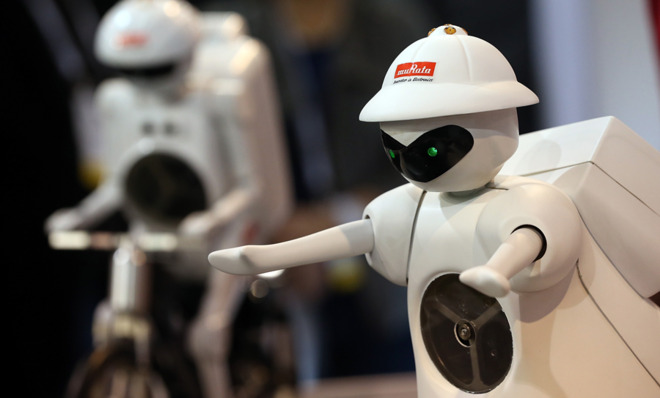Will a robot steal your job?
The safest fields are science, engineering, the arts, education, health care, and business management — disciplines that require high-level cognitive and emotional skills

A free daily email with the biggest news stories of the day – and the best features from TheWeek.com
You are now subscribed
Your newsletter sign-up was successful
The robots are coming, said Claire Cain Miller at The New York Times. Machines have already "progressed from displacing factory workers to personal assistants and even lawyers," and over the next decade, we'll see them more and more behind counters from the coffee shop to the airport. But on the question of "whether we're heading toward a robot-led coup or a leisure-filled utopia," Silicon Valley is "evenly split." According to a survey of nearly 2,000 technology experts by the Pew Research Center, 52 percent believe that robots won't displace more jobs than they create by 2025. But 48 percent of those polled had a much bleaker, almost dystopian view of how robots will probably affect society. They believe that many blue- and white-collar jobs will vanish over the next decade, and "they are not convinced that new ones will take their place," resulting in "a future of widespread unemployment, deep inequality," and even "violent uprisings."
Those fears are probably overblown, said Sarah Gray at Salon. Robots and new technologies will still need to be serviced, after all, and as new technologies emerge, so will the demand for the people who develop and improve upon them. And though driverless cars might replace the need for taxi drivers, and self-checkout kiosks make cashiers obsolete, new, "completely unimaginable" jobs could soon take their place. That's how progress works. In other industries — health care, for example — "human compassion, empathy, creativity, and judgment will be irreplaceable."
We can also take solace in the fact that "machines have been displacing humans this way for centuries," said Adrienne LaFrance at The Atlantic. The robot revolution, like the agricultural and industrial revolutions before it, will probably, on balance, leave humans better off. That said, just because an industry like health care or technology "survives a major transition doesn't mean the workers who are trained in the old way of doing things emerge unscathed — especially for those who don't have the skills or experience to adapt to new systems."
The Week
Escape your echo chamber. Get the facts behind the news, plus analysis from multiple perspectives.

Sign up for The Week's Free Newsletters
From our morning news briefing to a weekly Good News Newsletter, get the best of The Week delivered directly to your inbox.
From our morning news briefing to a weekly Good News Newsletter, get the best of The Week delivered directly to your inbox.
What's certain is that the challenge ahead will be "as much political as it is technological," said Adi Robertson at The Verge. Tomorrow's workers will need "high levels of flexibility and mastery of new skills as old ones become obsolete," and nearly everyone agrees our "educational system isn't preparing students to adapt." Governments will also have to decide what the state's role will be in responding to industry shifts and "how much of a social safety net they want to provide for displaced workers."
In the meantime, your best bet is to look for a job that is "still very hard for robots to do," said Edward D. Hess at Wired. The safest fields are science, engineering, the arts, education, health care, and business management — disciplines that require high-level cognitive and emotional skills. "Those are skills that technology is not likely to master soon. But the problem is that plenty of people haven't mastered them, either." We're still "capable of outthinking smart machines." Soon, it may be the only advantage we humans have left.
A free daily email with the biggest news stories of the day – and the best features from TheWeek.com
Sergio Hernandez is business editor of The Week's print edition. He has previously worked for The Daily, ProPublica, the Village Voice, and Gawker.
-
 How to Get to Heaven from Belfast: a ‘highly entertaining ride’
How to Get to Heaven from Belfast: a ‘highly entertaining ride’The Week Recommends Mystery-comedy from the creator of Derry Girls should be ‘your new binge-watch’
-
 The 8 best TV shows of the 1960s
The 8 best TV shows of the 1960sThe standout shows of this decade take viewers from outer space to the Wild West
-
 Microdramas are booming
Microdramas are boomingUnder the radar Scroll to watch a whole movie